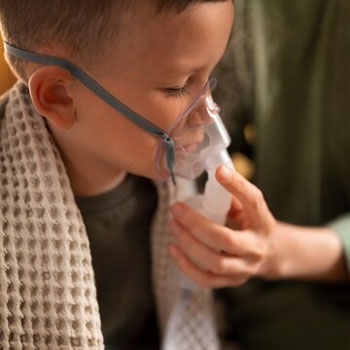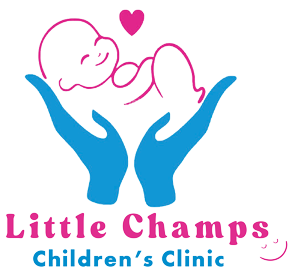Asthma is a chronic respiratory condition that affects millions of children worldwide. It causes the airways to narrow and swell, leading to difficulty in breathing, coughing, and wheezing. Early diagnosis and proper treatment are essential in managing asthma, especially in children, as it helps improve their quality of life. Little Champs Children's Clinic in Vijayawada, led by Dr. Anusha Chalasani, specializes in asthma treatment for children, making it one of the best centers for pediatric care in the region.
In this article, we will explore what asthma treatment entails, the different types of asthma, common treatments, and how Little Champs Children's Clinic provides expert care for children suffering from this condition.
What is Asthma in Children?
Asthma is a long-term inflammatory disease of the airways that primarily affects the lungs. It can cause frequent episodes of breathlessness, chest tightness, and coughing, often worsening at night or early in the morning. While asthma affects people of all ages, it is especially common in children. Understanding asthma's symptoms and getting timely treatment can help children lead healthier and more active lives

What are the Common Symptoms of Asthma in Children?
- Shortness of breath
- Wheezing (a whistling sound while breathing)
- Chest tightness or pain
- Persistent coughing, especially at night or during physical activity
- Difficulty sleeping due to breathing issues
In children, these symptoms can range from mild to severe, and they may worsen during certain seasons, such as during exposure to allergens or respiratory infections
What are the Causes of Asthma in Children?
Asthma's exact cause is unknown, but it is believed to be triggered by a combination of genetic and environmental factors. Common asthma triggers in children include
- Allergens (pollen, mold, pet dander)
- Air pollutants (smoke, dust)
- Respiratory infections (cold, flu)
- Physical activity (exercise-induced asthma)
- Weather conditions (cold air)
- Stress or emotional triggers
Asthma treatment focuses on controlling these triggers and managing symptoms through medications and lifestyle changes
How many Types of Asthma in Children?
Asthma can be classified into different types depending on the underlying cause and severity of symptoms. Understanding the type of asthma a child has is crucial for devising an effective treatment plan
Allergic Asthma
This is the most common type of asthma in children, triggered by exposure to allergens such as pollen, dust mites, or pet dander. Children with allergic asthma often have a history of other allergic conditions, like eczema or hay fever
Exercise-Induced Asthma
This type of asthma occurs when physical activity triggers symptoms such as shortness of breath or wheezing. It often happens during or after exercise, particularly when exposed to cold, dry air. Proper pre-exercise management can help children engage in physical activities
Cough-Variant Asthma
This type is characterized primarily by a persistent, dry cough that does not produce mucus. It can be difficult to diagnose, as it may not include the typical wheezing associated with asthma, but it requires similar treatments to control symptoms
Nocturnal Asthma
Children with nocturnal asthma experience symptoms that worsen during the night. This can cause difficulty sleeping and affect their daytime activities, leading to fatigue and reduced performance in school
Occupational Asthma
Though rare in children, exposure to certain environmental factors such as dust, fumes, or chemicals can trigger asthma. It is more commonly diagnosed in adults, but children exposed to similar conditions at home or school can also develop this type
What kind of Treatmens availa for Children Asthma?
Asthma cannot be cured, but it can be managed effectively with the right treatment plan. At Little Champs Children's Clinic, Dr. Anusha Chalasani tailors asthma treatment for each child based on their specific needs, age, and the severity of their condition. Below are some of the most common asthma treatments for children
Long-Term Control Medications
These are used to prevent asthma symptoms from occurring in the first place. They are typically prescribed for children with frequent or persistent asthma symptoms and include
- Inhaled Corticosteroids: These are the most commonly prescribed long-term control medications for asthma. They reduce inflammation in the airways, preventing asthma symptoms from becoming severe
- Leukotriene Modifiers: These oral medications block the action of leukotrienes, which are substances in the immune system that cause asthma symptoms
- Long-Acting Beta Agonists (LABAs): These medications help relax the muscles around the airways, making it easier to breathe. However, they are usually prescribed in combination with inhaled corticosteroids
Quick-Relief Medications (Rescue Inhalers)
These are used during an asthma attack to quickly open the airways and make breathing easier. They are not meant to replace long-term medications but are essential for immediate relief. Common quick-relief medications include
- Short-Acting Beta Agonists (SABAs): These are inhalers or nebulizers that provide rapid relief by relaxing the airway muscles
- Oral Corticosteroids: For severe asthma attacks, doctors may prescribe oral corticosteroids to reduce inflammation rapidly. These are usually short-term treatments
Allergy Medications
For children with allergic asthma, managing allergies is a crucial part of their asthma treatment. Antihistamines, decongestants, and nasal corticosteroids can help reduce the impact of allergens that trigger asthma symptoms. In some cases, immunotherapy (allergy shots) may be recommended to reduce a child's sensitivity to allergens
Asthma Action Plan
At Little Champs Children's Clinic, Dr. Anusha Chalasani develops a personalized Asthma Action Plan for each child. This plan includes
- Daily management strategies: Instructions on when and how to take medications
- Trigger avoidance: Steps to avoid known asthma triggers
- Emergency instructions: Guidelines on what to do if symptoms worsen, including when to seek medical help
Lifestyle Modifications
Parents play a key role in helping children manage their asthma by making lifestyle changes. These include
- Reducing exposure to triggers (e.g., using air purifiers, removing pets, or avoiding smoking around children).
- Ensuring the child stays physically active in a safe environment, with precautions for exercise-induced asthma
- Monitoring air quality and weather conditions that may exacerbate asthma symptoms
Why Choose Little Champs Children’s Clinic for Asthma Treatment?
Asthma treatment for children requires specialized care and attention to ensure their well-being. Little Champs Children's Clinic in Vijayawada stands out as one of the top choices for parents seeking comprehensive asthma care for their children
Expert Care by Dr. Anusha Chalasani
Led by Dr. Anusha Chalasani, a renowned pediatrician, Little Champs Children's Clinic is dedicated to providing personalized asthma treatment plans tailored to each child's needs. Dr. Anusha Chalasani is known for her deep understanding of pediatric respiratory issues, making her the best choice for asthma treatment in Vijayawada. Her compassionate approach ensures that both parents and children feel confident in managing the condition
Comprehensive Asthma Management
At Little Champs Children's Clinic, asthma management goes beyond just prescribing medications. The clinic provides continuous education for families on recognizing asthma symptoms, preventing asthma attacks, and ensuring proper use of inhalers and other medical devices
Advanced Facilities
The clinic is equipped with advanced diagnostic tools and treatment options, including pulmonary function tests and allergy testing, to ensure accurate diagnosis and effective treatment. The clinic's child-friendly environment also makes visits less stressful for children, encouraging better cooperation during treatments
Holistic Approach to Asthma Care
Dr. Anusha Chalasani and her team focus not only on treating the symptoms but also on preventing future asthma attacks. The clinic’s comprehensive approach includes educating children and parents about asthma triggers, lifestyle changes, and the importance of adhering to treatment plans
Emergency Care and Support
Asthma attacks can be frightening for both children and parents. Little Champs Children's Clinic offers emergency care services to ensure that children with severe asthma symptoms receive prompt attention. Parents can rest assured that their child’s health is in expert hands
Asthma is a manageable condition, and with the right treatment plan, children can lead a healthy, active life. At Little Champs Children’s Clinic, Dr. Anusha Chalasani and her team provide the best asthma treatment in Vijayawada, offering personalized care tailored to each child's unique needs. By combining expert knowledge, compassionate care, and state-of-the-art facilities, the clinic ensures that every child with asthma can breathe easy and live well
If your child is showing symptoms of asthma or has been diagnosed with the condition, don’t wait to get them the best care available. Visit Little Champs Children’s Clinic today and consult Dr. Anusha Chalasani, the best asthma treatment children’s doctor in Vijayawada
